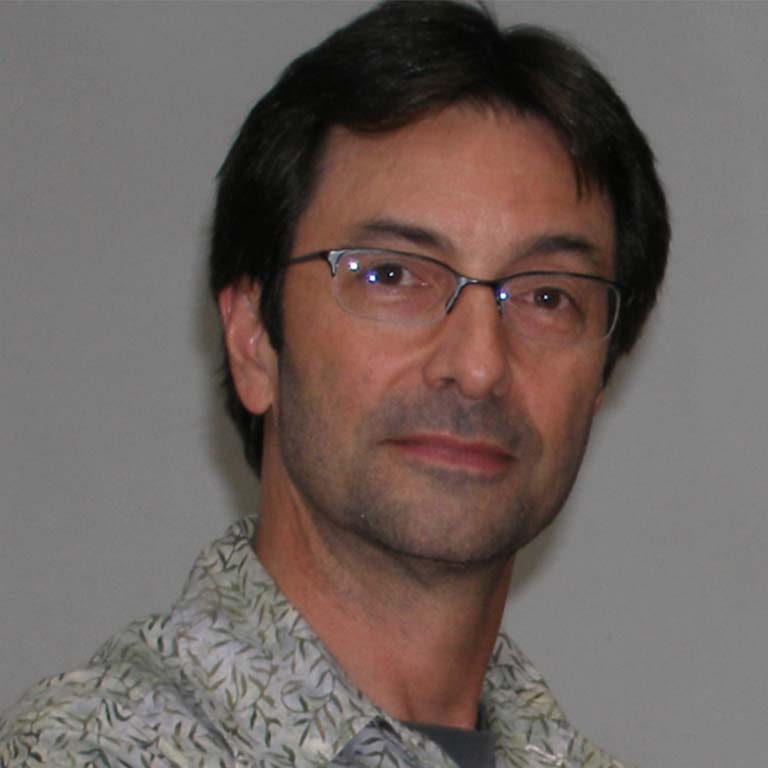- Ph.D., Harvard University, 1993
- Postdoctoral Fellow, Carnegie Institution of Washington, 1993-1998

Brian Calvi
Professor, Biology
(he/him/his)

Professor, Biology
(he/him/his)
Biology Bldg. 361
812-855-7271
Calvi Lab website
It is critical to discover the mechanisms of normal cell cycle regulation if we are to fully understand what goes awry in cancer cells. Genomic DNA must be fully and accurately replicated and then segregated into two daughter cells when cells divide. DNA replication that is uncoordinated from cell division causes “replication stress” and DNA damage, which is sensed and corrected by cell cycle checkpoints. Defects in both DNA replication and cell cycle checkpoints lead to high rates of DNA mutation (genome instability) and cause cancer. There have been major advances in understanding the molecular mechanisms that regulate DNA replication, the responses to replication stress, and how defects in these processes lead to cancer. Yet, there are many variations on the canonical cell cycle and checkpoint themes during development that remain little understood. Defining these themes and variations is necessary to fully understand how cell division and development are normally coordinated, and how errors in these molecular mechanisms in different tissue types cause cancer.
The research in my laboratory focuses on defining the molecular mechanisms that regulate DNA replication and cell cycle checkpoints during development. We have primarily used Drosophila melanogaster (fruit fly) as a model system. We have also worked with human cells in culture, both in my lab and as collaborations, to determine whether the mechanisms we have defined in flies are operative in humans. We have discovered new aspects of DNA replication and cell cycle checkpoint regulation in development.
Specific subtopics:
Chromatin, Chromosomes, and Genome Integrity
Developmental Mechanisms and Regulation in Eukaryotic Systems
Eukaryotic Cell Biology, Cytoskeleton, and Signaling
Huang YT, Hesting LL, Calvi BR. 2024. An unscheduled switch to endocycles induces a reversible senescent arrest that impairs growth of the Drosophila wing disc. PLoS Genet 20: e1011387.
Herriage, H. C. And Calvi, B. R. (2024) Premature endocycling of Drosophila follicle cells causes pleiotropic defects in oogenesis. Genetics 226: https://doi.org/10.1093/genetics/iyae009
Chakravarti, A, Thirimane, H, Brown, S, and Calvi, B.R. (2022) Drosophila p53 isoforms have overlapping and distinct functions in germline genome integrity and oocyte quality control. eLife, 11:e61389 doi: 10.7554/eLife.61389
Rotelli, M.D., Policastro, R., Bolling, A.M., Killion, A.W., Weinberg, A.J., Dixon, M.J., Zentner, G., Lilly, M., Walczak, C., and Calvi, B.R. (2019) A Cyclin A—Myb-MuvB—Aurora B network regulates the choice between mitotic cycles and polyploid endoreplication cycles. PLoS Genet 15: e1008253.
Lesly, S., Bandura, J.L., Calvi, B.R. (2017) Rapid DNA Synthesis During Early Drosophila Embryogenesis Is Sensitive to Maternal Humpty Dumpty Protein Function. Genetics 207, 935-947. PMC5676233 (featured in Highlight section and one of our micrographs was featured on the Genetics website)
Zhang, C, Montooth, K.L., and Calvi, B.R. (2017) Incompatibility between mitochondrial and nuclear genomes during oogenesis results in ovarian failure and embryonic lethality. Development, 144, 2490-2503 doi:10.1242/dev.151951 PMC5536873
Qi, S., and Calvi, B.R. (2016) Different cell cycle modifications repress apoptosis at different steps independent of developmental signaling in Drosophila. Mol. Biol. Cell, 27(12)1885-97. PMC4907722
Chen, S., Stout, J. R., Dharmaiah, S., Yde, S., Calvi,B.R. and Walczak, C.E. (2016) Transient endoreplication down-regulates the kinesin-14 HSET and contributes to genomic instability. Mol. Biol. Cell, 10(19):2911-23. PMC5042578